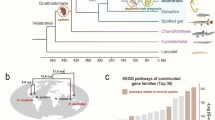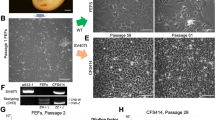Abstract
Arising from B. Venkatesh et al. Nature 505, 174–179 10.1038/nature12826 (2014)
Recently in this journal, Venkatesh and co-workers published their analysis of the elephant shark (Callorhinchus milii, a chimaera) genome sequence1. Their analyses suggested that at the evolutionary level of cartilaginous fish, only a primordial T-helper-cell (TH-cell) system was established, geared towards a TH1-type response, because they could not find several important candidate genes, or gene features, necessary for other types of TH cells. However, in contrast to Venkatesh and co-workers, I am able to find elephant shark candidate genes for interleukin-2 (IL-2), IL-4, IL-5 and IL-13, which have important roles in mammalian TH2 and T-regulatory-cell (Treg-cell) systems; furthermore, I feel that claims by the authors of absent CD4 and FOXP3 functions in cartilaginous fish are insufficiently substantiated. Therefore, I believe that major conclusions by the authors regarding proposed unique features of the T-cell system in the elephant shark are based on false arguments, or, as in the case of their CD4 model, are premature. There is a Reply to this Brief Communication Arising by Venkatesh, B. et al. Nature 511,http://dx.doi.org/10.1038/nature13447(2014).
This is a preview of subscription content, access via your institution
Access options
Subscribe to this journal
Receive 51 print issues and online access
$199.00 per year
only $3.90 per issue
Buy this article
- Purchase on Springer Link
- Instant access to full article PDF
Prices may be subject to local taxes which are calculated during checkout

Similar content being viewed by others
References
Venkatesh, B. et al. Elephant shark genome provides unique insights into gnathostome evolution. Nature 505, 174–179 (2014)
Ohtani, M., Hayashi, N., Hashimoto, K., Nakanishi, T. & Dijkstra, J. M. Comprehensive clarification of two paralogous interleukin 4/13 loci in teleost fish. Immunogenetics 60, 383–397 (2008)
Wen, Y., Fang, W., Xiang, L. X., Pan, R. L. & Shao, J. Z. Identification of Treg-like cells in Tetraodon: insight into the origin of regulatory T subsets during early vertebrate evolution. Cell. Mol. Life Sci. 68, 2615–2626 (2011)
Dijkstra, J. M. et al. Identification of a gene for an ancient cytokine, interleukin 15-like, in mammals; interleukins 2 and 15 co-evolved with this third family member, all sharing binding motifs for IL-15Rα. Immunogenetics 66, 93–103 (2014)
Andersen, K. G., Nissen, J. K. & Betz, A. G. Comparative genomics reveals key gain-of-function events in Foxp3 during regulatory T cell evolution. Front. Immunol. 3, 113 (2012)
Author information
Authors and Affiliations
Corresponding author
Ethics declarations
Competing interests
Declared none
PowerPoint slides
Rights and permissions
About this article
Cite this article
Dijkstra, J. TH2 and Treg candidate genes in elephant shark. Nature 511, E7–E9 (2014). https://doi.org/10.1038/nature13446
Received:
Accepted:
Published:
Issue Date:
DOI: https://doi.org/10.1038/nature13446
This article is cited by
-
A method for making alignments of related protein sequences that share very little similarity; shark interleukin 2 as an example
Immunogenetics (2021)
-
Transcriptome sequencing supports a conservation of macrophage polarization in fish
Scientific Reports (2020)
-
CD4: a vital player in the teleost fish immune system
Veterinary Research (2019)
-
Phylotranscriptomics suggests the jawed vertebrate ancestor could generate diverse helper and regulatory T cell subsets
BMC Evolutionary Biology (2018)
-
A cold-blooded view of adaptive immunity
Nature Reviews Immunology (2018)
Comments
By submitting a comment you agree to abide by our Terms and Community Guidelines. If you find something abusive or that does not comply with our terms or guidelines please flag it as inappropriate.



